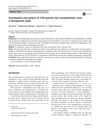 September 2016 in “Springer eBooks”
September 2016 in “Springer eBooks” Fat-derived stem cells may help treat skin aging and hair loss.
 September 2014 in “Springer eBooks”
September 2014 in “Springer eBooks” Aging causes hair to gray and thin, with the timing of graying varying by race, and factors like oxidative stress and genetics can lead to hair loss.
 January 2012 in “Human health handbooks”
January 2012 in “Human health handbooks” Low-level light therapy is FDA-approved for male pattern hair loss, increases hair count and strength, and is considered safe for use.
 136 citations,
February 2017 in “International Journal of Molecular Sciences”
136 citations,
February 2017 in “International Journal of Molecular Sciences” PRP treatment improves hair growth, and the device used can affect results, with some being more effective.
 68 citations,
March 2018 in “Biomaterials”
68 citations,
March 2018 in “Biomaterials” Tiny needles with valproic acid can effectively regrow hair.
 51 citations,
January 2004 in “Skin Pharmacology and Physiology”
51 citations,
January 2004 in “Skin Pharmacology and Physiology” The document explains hair growth and shedding, factors affecting it, and methods to evaluate hair loss, emphasizing the importance of skin biopsy for diagnosis.
 33 citations,
November 2012 in “Journal of The American Academy of Dermatology”
33 citations,
November 2012 in “Journal of The American Academy of Dermatology” FPHL common in Taiwanese women; risk factors include BMI, high glucose, early puberty, fewer childbirths, oral contraceptives, and UV exposure.
 25 citations,
November 2012 in “Phytotherapy Research”
25 citations,
November 2012 in “Phytotherapy Research” Crataegus pinnatifida extract may help increase hair growth and thickness in mice.
 17 citations,
November 2012 in “Maturitas”
17 citations,
November 2012 in “Maturitas” The conclusion is that proper evaluation and treatment of hair loss in midlife women is important, considering the emotional impact and potential for various treatments.
 17 citations,
June 2011 in “The journal of investigative dermatology/Journal of investigative dermatology”
17 citations,
June 2011 in “The journal of investigative dermatology/Journal of investigative dermatology” The G60S Connexin43 mutation causes hair growth issues and poor hair quality in mice, similar to human ODDD patients.
 14 citations,
July 2019 in “Experimental and Molecular Medicine”
14 citations,
July 2019 in “Experimental and Molecular Medicine” Nanog gene boosts stem cells, helps hair growth, and may treat hair loss.
 12 citations,
August 2013 in “Facial Plastic Surgery Clinics of North America”
12 citations,
August 2013 in “Facial Plastic Surgery Clinics of North America” Choose hair restoration surgery candidates carefully and plan treatments for a natural look and future hair loss.
 11 citations,
December 2016 in “Frontiers in Psychology”
11 citations,
December 2016 in “Frontiers in Psychology” Hair style affects perceptions of age, health, and attractiveness more than hair color does.
 8 citations,
January 2020 in “Skin appendage disorders”
8 citations,
January 2020 in “Skin appendage disorders” Saw palmetto supplements may modestly improve hair regrowth with few side effects, but more research is needed.
 8 citations,
May 2019 in “Indian Journal of Plastic Surgery/Indian journal of plastic surgery”
8 citations,
May 2019 in “Indian Journal of Plastic Surgery/Indian journal of plastic surgery” Plasma is better than Ringer's lactate for hair graft survival and growth after transplantation.
 7 citations,
September 2014 in “Beni-Suef University Journal of Basic and Applied Sciences”
7 citations,
September 2014 in “Beni-Suef University Journal of Basic and Applied Sciences” Cuscuta reflexa extracts and an isolate promoted hair growth and could be natural treatments for hair loss.
 5 citations,
September 2017 in “Plastic and Aesthetic Research”
5 citations,
September 2017 in “Plastic and Aesthetic Research” Low dose cyclical nutrition therapy can consistently and safely improve hair growth and density without needing anti-androgens.
 3 citations,
December 2020 in “Journal of the turkish academy of dermatology”
3 citations,
December 2020 in “Journal of the turkish academy of dermatology” Stromal Vascular Fraction treatment increases hair density and thickness, making it a safe and effective treatment for Androgenetic Alopecia.
 1 citations,
January 2023 in “Journal of Clinical Medicine”
1 citations,
January 2023 in “Journal of Clinical Medicine” A new hair restoration technology was found to effectively increase hair thickness, density, and growth, while reducing hair loss and improving scalp health, with no side effects.
 1 citations,
October 2018 in “European Journal of Plastic Surgery”
1 citations,
October 2018 in “European Journal of Plastic Surgery” The study found that hair transplant complications are rare, with swelling being the most common issue.
 1 citations,
January 2018 in “Springer eBooks”
1 citations,
January 2018 in “Springer eBooks” Photobiomodulation is an effective and safe treatment for increasing hair growth in people with hair loss.
 December 2023 in “International journal of research in dermatology”
December 2023 in “International journal of research in dermatology” The ayurvedic hair oil is safe and effective for reducing hair fall, promoting hair growth, and improving scalp health.
 December 2023 in “Journal of Cosmetic Dermatology”
December 2023 in “Journal of Cosmetic Dermatology” The hair growth product was effective and safe, increasing hair growth, thickness, and density while reducing hair fall.
 April 2023 in “Acta Poloniae Pharmaceutica”
April 2023 in “Acta Poloniae Pharmaceutica” Herbal extract shampoo increased certain minerals in hair and improved hair growth and scalp health.

A hair transplant using hair from the back of the head and pubic area was successful in creating a feminine hairline for a male-to-female transgender person.

Sinsun-yukza-hwan extract promotes hair growth in mice.
 January 2015 in “Springer eBooks”
January 2015 in “Springer eBooks” Fat-derived stem cells and their secretions show promise for treating skin aging and hair loss.
 September 2015 in “SelfCare Journal”
September 2015 in “SelfCare Journal” Two treatments for male pattern hair loss are minoxidil and finasteride, but they have side effects and may not satisfy everyone.
 269 citations,
August 2002 in “Journal of The American Academy of Dermatology”
269 citations,
August 2002 in “Journal of The American Academy of Dermatology” 5% minoxidil works better for hair growth and density, with minor irritation.
 88 citations,
July 2019 in “International Journal of Molecular Sciences”
88 citations,
July 2019 in “International Journal of Molecular Sciences” Using human fat tissue derived stem cells in micrografts can safely and effectively increase hair density in people with hair loss.






























